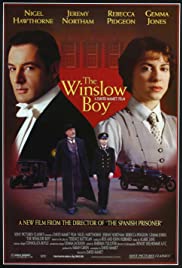
THE WINSLOW BOY
UK, 1999, 104 minutes, Colour.
Jeremy Northam, Nigel Hawthorne, Rebecca Pidgeon, Gemma Jones, Matthew Pidgeon, Sarah Flind, Aidan Gillett, Guy Edwards, Colin Stanton.
Directed by David Mamet.
It is surprising to find that American playwright, David Mamet, best known for his hard-hitting and hard-language plays like American Buffalo, Speed the Plow, Glengarry Glen Ross and movies like The Verdict, The Untouchables, has a great admiration for the dramatic skills and the use of language by British playwright Terence Rattigan (Separate Tables, Sleeping Prince, Browning Version). Mamet has adapted the play with great respect and directed the movie.
He recreates Edwardian England in great detail, suggesting the prim social order of pre- World War I days and the desire to preserve order and decorum. The case is a small one, of a boy accused of stealing a money order, but it is symbolic of the need for truth and the rights of the individual.
The screenplay stays closer to Rattigan's text (which is solely in the Winslow house) than Anthony Asquith's 1947 version which had a masterly performance by Robert Donat as Sir Robert with Cedric Hardwicke as Winslow and Margaret Leighton as Catherine. That film highlighted Morton's parliamentary speech, 'that right be done' as does this version.
This is an intelligent movie that has regard for the skills of drama, language and production values.
1. The status of the play by Terence Rattigan? The film version of 1948? The 1999 version, the impact of this story of 1911?
2. Directed by David Mamet, his reputation as a playwright, American, strong issues, his interest in Rattigan?
3. A film of British traditions, the Navy, parliament, the law, working class people? In the period, pre-World War I?
4. The title, the focus on Ronnie? His age, experience, the family sending him to the school, the Navy? His arriving home, the mystery, the postal note, the accusation? Authorities expelling him? The consequences? The issue of the truth or not? The reaction of each member of the family?
5. The school scenes, the atmosphere, the boys, the situation with the note, the authorities?
6. Mr Winslow, in the bank, his believing his son, supporting his son? Mrs Winslow, her devotion, finding the situation difficult? Catherine, her believing her brother? Dickie and his university studies? Desmond Curry, the law, his help?
7. Catherine, strong character, age and experience, suffragette? The engagement with John, the party, the interruption, Ronnie returning home? John, the influence of his father, strong-minded, the breaking of the engagement?
8. Sir Robert Morton, his role in the government,, the role of the Attorney General and decisions about cases, the Naval College, permissions for a trial, the debate in the House?
9. Sir Robert’s character, his interview with Ronnie, believing him, taking the case? Catherine and her suspicions? His Conservative stances, women’s issues and his opposition? His visits, his attraction to Catherine?
10. The media response, the continued strain on the family, Mr Winslow’s health, stubborn stances? The consequences? Having to let Violet go? Dickie returning from University
and working in the bank? The breaking of the engagement? Des and his stepping in loyally for Catherine?
11. Sir Robert, his defence, to defend the right, not accepting the position of Lord Chief Justice, Violet in the court, coming home, the news, the impact?
12. Sir Robert and his return – and a future with Catherine?